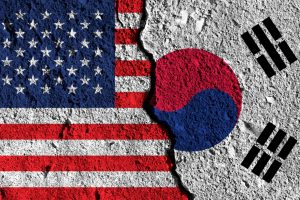The Inflation Reduction Act (IRA) is a diplomatic blunder. Just consider how much time and resources Washington has been spending since the law’s enactment in August 2022 in responding to angry reactions from Brussels and Seoul, the two most affected by the legislation. This issue was put at the top of the agenda in the European Union’s and South Korea’s diplomatic meetings with the United States. Various channels at a wide range of levels are being mobilized to convey Korean and European concerns. And this is all happening at a time when close cooperation and coordination is most critical amid the war in Ukraine and China-U.S. confrontation in the Asia Pacific. The diplomatic toll will continue to climb in 2023 as global challenges further intensify.
The mistakes in the IRA should be fixed before it is too late.
The IRA generally is an innovative and timely piece of legislation meant to expedite diverse measures to cope with climate change through $430 billion in funding. In the lengthy act, which runs for 273 pages, the point that rattled the two key U.S. allies is that $7,500 in tax credits for electric vehicles will be given only if the vehicles are “assembled in North America.” As European and South Korean automakers assemble their EVs in their home factories, U.S. buyers cannot buy them to claim the credit (and thus, likely will not buy them at all). That sparked an angry reaction from Brussels and Seoul, fearing their automakers would be pushed out of the booming EV market.
As with many laws impacting foreign trade, the American-made tax credit clause quickly brought up legal debates, both under U.S. domestic law and trade agreements. The real triggering point, however, is not as much legal as emotional – a sense of betrayal and abandonment. It’s sad this timely legislation is viewed with such anger abroad just because of one unseemly element.
For the climate change-sensitive EU, the clause tweaks the noble cause of environmental protection into a new vehicle for industrial policy. They fear the IRA is the first of many similar actions to come. Similar schemes could spread across the globe, which would carve a wide pit at the base of the global climate change endeavor. It could ruin the EU’s climate initiative.
South Korea’s embarrassment is more dramatic. In response to repeated U.S. requests, South Korean giant Hyundai has been scrambling to expand its automobile manufacturing facilities in the United States. When President Joe Biden visited South Korea in May, Hyundai unveiled a $10.5 billion investment plan, including the completion of EV factories in the U.S. state of Georgia by 2025. Biden responded by thanking Hyundai “for choosing the United States,” adding, “We will not let you down.” The abrupt reversal of fortune less than three months later with the IRA’s passage in August surprised the company and the South Korean government.
The May remark may have been just political rhetoric, but the blitzkrieg enactment of the IRA, ignoring Hyundai’s planned completion of the EV plant in Georgia, has since induced national controversy. Most importantly, this happened at a time when Seoul is making serious efforts to accommodate Washington’s requests in the intensifying China-U.S. standoff. The IRA has put the Seoul government in an extremely awkward situation domestically. If anything, South Korea’s participation in the Indo-Pacific Economic Framework, Chip 4 Alliance, and Quad will face re-invigorated domestic critics ready to cite the IRA experience as their prime evidence.
Addressing this issue from a legal perspective seems neither wise nor practical. A WTO challenge may be impractical given the current paralysis of the Geneva-based institution’s dispute settlement function. It would only worsen the situation, as arguably this is not something amenable to legal resolution. The real question here is not about legal interpretations; it is about how to find common ground in formulating new regulatory schemes for climate change in the emerging landscape of the digital economy. Finding violation or non-violations of existing trade agreements will lead us nowhere. Instead, what is needed at this point is something practical and achievable.
It would be hard, if not impossible, to amend the IRA at this stage – after all the legislative process at Congress is long-since completed and the law’s application began on January 1, 2023. Practically speaking, the only way out seems to be finding flexibility, if at all possible, within the confines of the existing statutory language.
In the IRA, the condition for the tax credit is that the EVs must be “assembled in North America.” In turn, final assembly is defined in the act as “the process by which a manufacturer produces a […] vehicle [so that it can be] delivered to a dealer [ready for] mechanical operation.” This definition is broad enough to cover a variety of final processes at an automobile plant, and the U.S. government might build on this statutory definition so as to include some bona fide foreign EVs in the IRA tax benefit coverage.
Washington might select some meaningful final process of EV production and elaborate upon it in relevant agency regulation. In this way, the administration may still stay within the limits of the IRA, while addressing the core concern of Brussels and Seoul. That offers one practical solution to the current diplomatic deadlock. Possibly, all sides could save face.
Consider all the diplomatic capital the U.S. government has been spending on the IRA since it was signed into law on August 16, 2022 – and, more importantly, the damage that will continue to be incurred in the new year. This important legislation on climate change inadvertently caused a diplomatic blunder at a most critical time. Biden and the U.S. government should calibrate the overall impact of the controversial provision in the IRA, and find a possible way out before it takes further toll on relations with key allies.

































